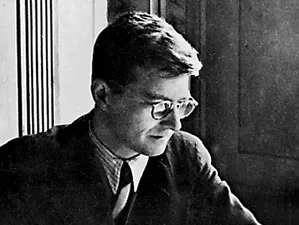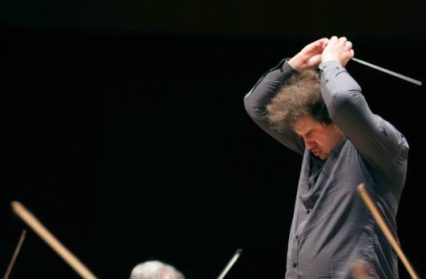Nigel Jarrett reviews a Cardiff performance of Shostakovich and Mahler by the WNO Orchestra featuring mezzo-soprano Tara Erraught
Some estimates put the number of children who died in the siege of Leningrad at upwards of 400,000. They were scattered among both the citizens who stayed and the 1.4 million, mainly women and the young, evacuated from the beleaguered city yet still decimated by starvation and artillery bombardment. The final casualty figures, possibly under-estimated because of lost records and the numbers of immigrants entering the city in flight from turmoil elsewhere, beggar belief. In addition to those who perished in the evacuation, 1.5 million were to die among those who stayed. Prolonged silence, at least more than the sixty seconds of formal remembrances, might appear to be the only response, were it not for music’s ability to say more than words about the horrors of human suffering.
The pairing of music by Mahler and Shostakovich at this concert in the International Series at St. David’s Hall (one, incidentally, that counts the Orchestra of Welsh National Opera as deserving of inclusion beyond the convenience of having the company domiciled just down the road) was on the nail. It was also part of the ongoing Russian commemoration in Wales of 100 years since the Revolution.

From the start of his composing career, Mahler was fascinated by death. Joy was always tempered by despair, and this was reflected in his juxtaposing method of composition, in which different musical materials and emotions jostle. If it were not for the back-and-forth sweep of the scythe as the German salvoes rained down on Leningrad, the choice of Mahler’s Kindertotenlieder, a song cycle of poems by Rückert on the death of children, might have been the obvious prelude. (Two of the poet’s children died of scarlet fever and eight of Mahler’s siblings were to die young). Instead we were offered the composer’s Lieder eines fahrenden Gesselen (Songs of A Wayfarer), an equally bleak outlook punctuated by leavening relatives. The singer, like the one who carries the burdens of the lovesick in Schubert’s Winterreise, oscillates between memories of happiness and disillusionment. It may be an inward-looking anguish, but it surveys the same landscape. In matters of the heart, it has to be said, Mahler was a rum cove.
For this cycle of four songs, the Irish mezzo Tara Erraught was a model of composure, intent on narrowing her range of tonality, not always to the good, and allowing the voice to do everything unaided by over-much facial expression and other body language. This was especially effective in the first song, Wenn mein Schatz Hochzeit macht (When My Darling has her Wedding Day) and the final one, Die Zwei Blauen Augen (The Two Blue Eyes), representing the start and finish of almost unrelieved despondency were it not for the respite of Ging heut’ Morgen über’s Feld (I Walked Across The Fields) and that late clambering into the light, which might have been made more of.
One always feels that these utterances of love’s disillusionment in music belong to the young, though it is often older singers who can bring to them the element of reflection on experience, albeit with some loss of immediacy. And it’s always good to hear the distaff side’s take on matters. The plunge into psychodrama of the third song, Ich hab’ ein glühend Messer (I Have a Red Hot Knife) was, however, headlong, and made any sort of return from the depths welcome. By the end, the orchestra, everywhere intensifying the singer’s isolation and distress, had prepared for what was to follow.

Shostakovich’s Seventh Symphony, the ‘Leningrad’, is as long as its survey of soul-stirring and its depiction of the siege itself are broad and epic. But, as always with this composer, not everything is as it seems. Once more, the WNO orchestra and its music director and conductor Tomáš Hanus, fully armed and battle-ready, were in for the duration, as they were for a memorable Mahler Resurrection Symphony at the same venue last year in the MD’s company début. Take that silly clockwork tune in the opening allegretto, for instance, brilliantly tick-tocked here and reaching its proper cacophony: is it the Wehrmacht on its way to obliterate the city, or the robotic motions and increasing oppressiveness of the Russian state headed by Stalin? (It would be a ready accompaniment to a platoon of pen-pushers interminably signing death warrants, followed by the savage purges themselves.) And was not the symphony’s gist and its main material gotten before the war in the light of the brutalities of the 1930s? Whatever. Such caveats are in some ways digressive insults to the memory of those who died in the two-year Blokada Leningrada.
Perhaps more relevant today is whether or not the symphony’s ever-spreading canvas, with all that means in the need for cuts and compression, trumps as music its historical place and the stories surrounding it. After all, most propaganda music – and the Seventh was even loud-speakered to the besiegers – usually enslaves its purely musical content. But somehow, not this one. Hanus made sure there was no ambivalence in that first movement. This was war, as denoted in the movement’s original title, though the killing machines had further to roll than those in the opening of Holst’s The Planets suite. It’s always a fatuous comment, but opera company orchestras know how to set the scene, even with the multitude of players here assembled, which could never be accommodated in your average theatre pit. Not for nothing does Shostakovich employ such vast numbers. The end of the opening allegretto under Hanus’s direction was at the end riotous with terror and dread, and for the conductor a tribute to the disciplined use of the orchestra in layers, transforming the apparently banal to the horribly grotesque.
It’s in the second and third movements that the performance gave notice of the music having travelled far, with the listener wondering how things were going to turn out and whether further progress was to be circular. In the third particularly, the scene-painting, though later on edgy, took us to a place of relative safety and calm. By this time, it had become clear from the beginning that sombrely-played solo instruments, catching moods almost to perfection – violin, piccolo, bassoon, side-drum, oboe, cor anglais, flute and bass-clarinet – were exemplars of how the few could arise from the many and speak truth for them. At the end it was everyone on board for noisy exultation and celebration of whatever victory the music is recognising over whatever form of evil. Opera orchestras also know how to make a drama out of a crisis and press home an ending. More interesting times ahead, one suspects, for the WNO with Hanus in charge of the music.
St David’s Hall, Cardiff, 23 November, 2017
Orchestra of Welsh National Opera
Mezzo-soprano: Tara Erraught
Conductor: Tomáš Hanus
Mahler: Lieder eines fahrenden Gesellen
Shostakovich: Symphony No. 7 in C (the ‘Leningrad’)
Nigel Jarrett is a freelance writer and regular contributor to the Wales Arts Review. He is a poet, novelist, and story writer. His latest collection of stories, Who Killed Emil Kreisler?, was published last year. He is a winner of the Rhys Davies prize for short fiction and, in 2016, the inaugural Templar Shorts award. He also writes and reviews for Jazz Journal. Next year sees the publication of his short fiction pamphlet, A Gloucester Trilogy.



 Enjoyed this article? Support our writers directly by buying them a coffee and clicking this link.
Enjoyed this article? Support our writers directly by buying them a coffee and clicking this link.







